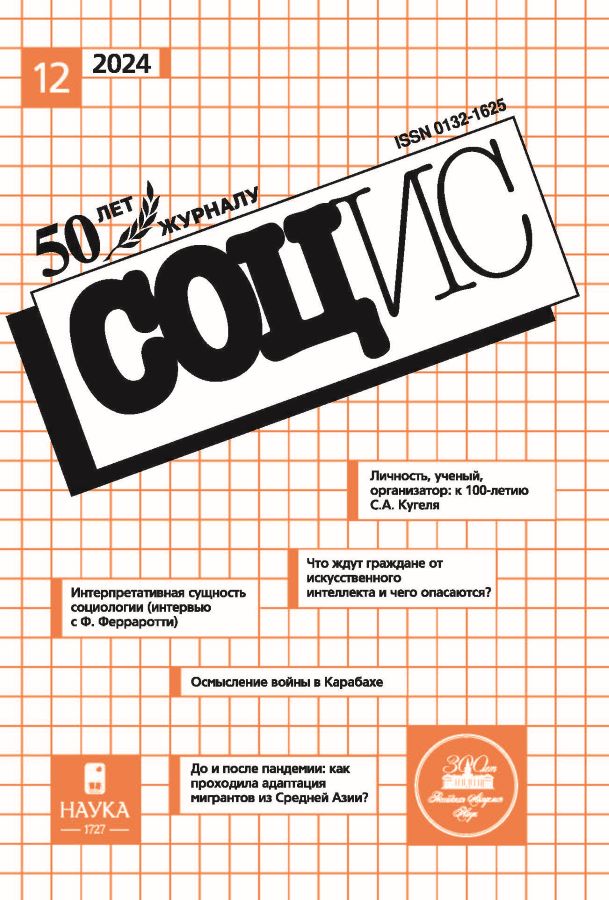Reference societies and societal security shocks in Russia
- Authors: Karacharovskiy V.V.1
-
Affiliations:
- HSE University
- Issue: No 12 (2024)
- Pages: 138-149
- Section: DISCISSION. POLEMICS
- URL: https://ruspoj.com/0132-1625/article/view/683581
- DOI: https://doi.org/10.31857/S0132162524120128
- ID: 683581
Cite item
Abstract
The article develops a hypothesis about the gravitational nature of societal security shocks as the phenomena of destabilizating the value core of societies because of critical changes at their geographical and cultural “borders”. The category of “reference countries/societies” is introduced, the gap in the results of development with which leads to the loss of legitimacy of the path of development chosen by society. The societal security level of Russia is assessed basing on GDP per capita and HDI difference with the groups of countries historically and geopolitically connected with Russia (the “West World”, the former “Socialist Bloc”, the countries of the former USSR, the countries of the EAEU, BRICS and SCO). The difference of these indicators is adjusted to the Russians’ interest to the countries. Then the gravity model of Russians’ interest to other countries is estimated, using as the indicator of interest the statistics of Internet queries on Google Trends and Yandex Wordstat, and as an indicator of the distance the “cultural distance” between the countries, calculated basing on Hofstede’s indices. It is shown that the level of social security for Russia is maximal in relation to the SCO countries and minimal in relation to the “West World” countries. Herewith Russian’s interest is strongest for the group of geopolitical rivals (the “West World”) and is moderate for the friendly countries (BRICS and SCO). The marginal interest in countries monotonically decreases with the growth of tourist flows to them (as a proxy-variable of saturation of information or experience about them). Finally, the inverse dependence of Russians’ interest for countries on their “cultural distance” with Russia in the “West World” – “Global South” – other countries’ system is demonstrated.
Full Text
About the authors
Vladimir V. Karacharovskiy
HSE University
Author for correspondence.
Email: vvk@hse.ru
Cand. Sci. (Econ.), Assoc. Prof., Faculty of Economic Sciences, Head of the Laboratory for Comparative Analysis of Post-Socialist Development
Russian Federation, MoscowReferences
- Akami T. (2006) In the Name of the People: Welfare and Societal Security in Modern Japan and Beyond. Asian Perspective. Vol. 30. No.1: 157–190.
- Alexseev M. A. (2011) Societal Security, the Security Dilemma, and Extreme Anti-Migrant Hostility in Russia. Journal of Peace Research. Vol. 48. No. 4: 509–523.
- Bauman Z. (2005) The Individualized Society. Transl. ed. by. V. L. Inozemcev. Moscow: Logos. (In Russ.)
- Bilgik A. (2013) Towards a New Societal Security Dilemma: Comprehensive Analysis of Actor Responsibility in Intersocietal Conflicts. Review of International Studies. Vol. 39. No.1: 185–208.
- Birrell B. (2007) Australian Futures: Societal Security and Identity. Global Forces. Proceedings of the ASPI conference: Australian Strategic Policy Institute: 29–39.
- Bronitsky G., Vakulenko E. (2022) Using Google Trends for external migration prediction. Demographic Review. Vol. 9. No. 3: 75–92. (In Russ.)
- Butler E. (2007) Hungary and the European Union: The Political Implications of Societal Security Promotion. Europe-Asia Studies. Vol. 59. No. 7: 1115–1144.
- Buzan В., Wæver O. (1997) Slippery? Contradictory? Sociologically Untenable? The Copenhagen School Replies. Review of International Studies. Vol. 23. No. 2: 241–250.
- Etziony A. (1999) Debate: The Good Society. The Journal of Political Philosophy. Vol. 7. No. 1: 88–103.
- Fedotova V. G. (1997) Modernization of the «Other» Europe. Moscow: Institut Filosofii RAN. (In Russ.)
- Gorshkov M. K., Tyurina I. O. (2023) Consolidation of the Russian Society under Contemporary Challenges: Social-Historical and Value Contexts. RUDN Journal of Sociology. Vol. 23. No. 4: 720–739. (In Russ.)
- Hantington S. (2003) The Clash of Civilizations. Transl. by T. Velimeev, Yu. Novikov. Moscow: OOO «Izdatel’stvo AST». (In Russ.)
- Herd G. P., Lofgren J. (2001) ‘Societal Security’, the Baltic States and EU Integration. Cooperation and Conflict. Vol. 36. No. 3: 273–296.
- Kogut B., Singh H. (1998) The Effect of National Culture on the Choice of Entry Mode. Journal of International Business Studies. Vol. 19. No. 3: 411–432.
- Konara P., Mohr A. (2019) Why We Should Stop Using the Kogut and Singh Index. Management International Review. Vol. 59: 335–354.
- Latov Yu.V. (2023). Dynamics of Mass Consciousness of Russians: Extraordinary Situation or Beginning of a New Cycle? Polis. Political Studies. No. 6: 161–179. (In Russ.)
- McSweeney B. (1996) Identity and Security: Buzan and the Copenhagen School. Review of International Studies. Vol. 22: 81–93.
- Nye J. S. (2009) Get Smart: Combining Hard and Soft Power. Foreign Affairs. Vol. 88. No. 4: 160–163.
- Panarin A. S. (2004) Global Political Forecasting. Excerpts from a Speech at the Methodological Seminar at Moscow State University of the Humanities // Znanie. Ponimanie. Umenie [Knowledge. Understanding. Skill]. No. 1: 171–173. (In Russ.)
- Romanovskiy N. V., Demidenko S. Yu. (2023) The New Social Reality (On the XXIV A. Kharchev’ Readings). Sotsiologicheskie issledovaniya [Sociological Studies]. No. 1: 147–150. (In Russ.)
- Sundelius B., Eldeblad J. (2023) Societal Security and Total Defense: The Swedish Way. PRISM. Vol. 10. No. 2: 92–111.
- Shumilov A. (2017) Estimating Gravity Models of International Trade: A Survey of Methods. HSE Economic Journal. Vol. 21. No. 2: 224–250.
- Varian Hal R., Choi H. (2010) Predicting the Present with Google Trends. April 2. URL: https://ssrn.com/abstract1659302 (accessed 02.09.2024).
- Wæver O., Buzan B., Kelstrup M., Lemaître P. (1993) Identity, Migration and the New Security Agenda in Europe. London: Pinter.
Supplementary files










